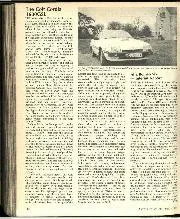
Alfa Romeo Six
Interim Report The 1981 Editorial Alfa Romeo Alfa-6 continues to run satisfactorily, the mileage since I reported unit at length on the March issue having increased to over 23,000, from…

It’s always difficult to admit weakness from a position within an industry, but I’m sure it would be no great revelation if I state that classic car auctions as a whole haven’t and don’t always get a great press. Stories abound of poor descriptions, slow payments, manipulated bidding and other general Del Boy-isms. Some may be apocryphal but there’s no doubt substance to some of them.
Then there’s the usual suspects, up and running one day and disappearing into the middle distance with vendors’ cars, money, etc, the next. Then, lo and behold, back within the week complete with an altered company name, but not held culpable for any of the above.
It’s no wonder that some buyers and sellers would rather subject themselves to a barrage of tyre-kickers and time-wastrels in their search for a sale than darken the door of an auction house. And yet, in times of disruption, new business models often rise to the fore.
“A drop in the quality of service has a direct impact on results achieved”
It’s just a thought, and it may not be popular with all, but it could be that the time is right for an industry code of conduct. It’s been mooted during my recent discussions with other trade members and noted industry watchers.
The following are working notes on what could be included. Many have been adapted from other auction bodies from around the world.
Auction houses should:
• Ensure that all communications with clients are fair, clear, timely and transparent.
• Refrain from exaggerating auction prospects in the hope of securing business.
• Provide a clear and public record of each auction completed.
• Be honest in company advertising.
• Guarantee that the bidding process is fair and refrain from house bidding in order to artificially inflate value.
• Ensure that there is a fair balance of both sellers’ and buyers’ rights.
• Abstain from making a profit on any extraneous client expenditures.
• Avoid deliberate arrangements in order to withhold relevant information from the public.
• Make buyers aware of there being no warranties or guarantees beyond what is written and communicated.
• To provide clearly written and legally binding agreements
The auction world has always, and will always, be the domain of caveat emptor. But unless we are full and transparent in describing any product and service offered, then how can the ‘buyer beware’ of what they are getting into?
After all, consumer advice always recommends you do your research before choosing any service or a product. A code of conduct gives people a benchmark to check against, and a reason to walk if the service level drops during their consultations and interactions.
It’s right there in the Fifty Shades of Auction Grey that disillusionment, distrust and disappointment are born, and an industry’s image is besmirched. We have been in this situation for a relatively short period, but we have already witnessed the rise and fall of others.
Reputations that are won over years of hard exertion can be lost frighteningly quickly. Just a small drop in the quality of service does have a direct impact on results achieved. If, however, we can provide the right level of illumination by way of operating guidelines, something that all professionals agree to adhere to, then perhaps it would help to refresh, re-brand and re-set the sector’s tarnished image.
And that would be good for everyone.
Tristan Judge is director and co-founder of The Market, the online auction platform for classic and collectible cars